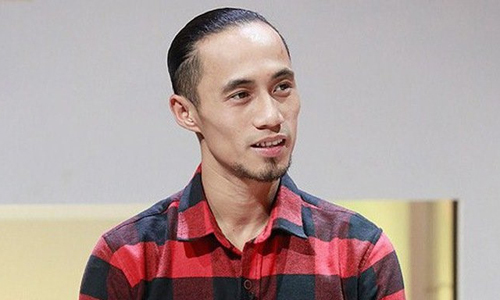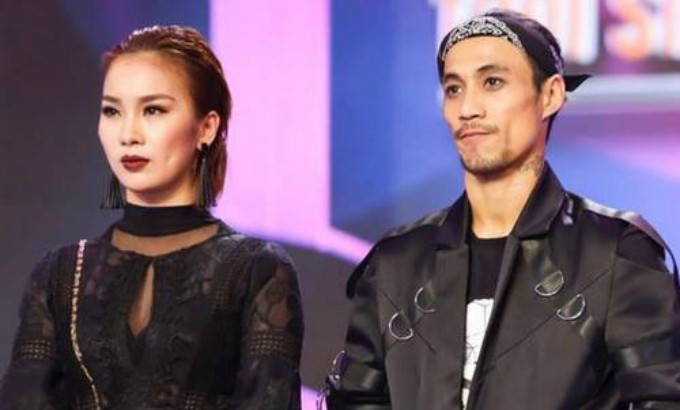UNFPA ends deal with Vietnamese celeb accused of sexual harassment
It looks like Vietnam is having its #MeToo moment as three young women have spoken up.

Vietnamese rocker Pham Anh Khoa. Photo by VnExpress/Ha Thu
A Vietnamese celebrity has lost his position as ambassador for a campaign to end violence against women and girls by the United Nations Population Fund (UNFPA) in Vietnam following sexual allegations against him.
UNFPA has also removed all photos of rocker Pham Anh Khoa, who was picked as ambassador in July last year, from its Facebook page, after three women accused the 33-year-old father of two of having inappropriate behaviors when working with them.
"UNFPA and the U.N. in Vietnam would like to praise the bravery of Pham Lich and Nga My. The two women have overcome their fear and social prejudice to speak up and tell the public about their own sexual harrasment experience. We should encourage more Vietnamese women to stand up like them," the organization said in a press release issued on Monday.
Lich, a Vietnamese professional dancer, spoke against Khoa in late April.
Lich, 28, used to work with Khoa in the show “Troi Sinh Mot Cap,” a Vietnamese adaptation of the Dutch program “It Takes 2,” in which an amateur singer will be trained to perform as a duet with a professional singer.
“He touched all over my body,” she said.
She also showed text messages, which she said came from Khoa, inviting her to come over to his house at night more than once for practice, “because there is no one at home.”
He also called her by “sexual nickname” in front of other people, Lich said.

Pham Lich (L) and Pham Anh Khoa stand on stage in the musical show "Troi Sinh Mot Cap," as shown in a file photo by VnExpress.
A few days later, Khoa took it to Facebook, claiming that Lich had “slandered me" and “smeared my reputation.” He also threatened Lich that he would take the case to court.
Then another dancer, Le Hoang Nga My, 23, decided to step in.
My said Khoa's response to Lich's allegations urged her to stand up because “I want people to know who Khoa really is.”
She said Khoa did the same things with her: flirting, inviting her over to his house and a hotel he was staying, at night.
Both My and Lich have said that they are ready to present evidence if the case is taken to court.
And when netizens and fans are still confused with this “he said-she said” story, another woman who wanted to remain anonymous decided to share her story from four years ago.
"He pushed me and pressed my face against the wall. He locked my hands with his hand. He was too strong and I was weak. I could not move. He evened covered my mouth with his other hand. He pressed his body against mine, kissed my neck and shoulder," the woman, identified only as M.P., a stylist, told an online news site.
She said she remembered the exact words that Khoa told her: “You cannot get out of me. I’m gonna have what I want. The more you fight back, the more pleasure for me.”
She said she had been living in shock and depression ever since the sexual assault.
In the middle of the storm, Khoa decided to make a public apology on Saturday, but only to make things worse.
He said that he did not do anything that should be described as “sexual harassment,” and he apologized for “anything I did and said without notice that it might have hurt anyone.”
He said he was not aware that what he did or said was unacceptable. “I have never learned about those boundaries and in the world of art, no one cares about those things.”
“It's normal for people who have a quite close connection to tap each other’s buttocks in the showbiz environment. It was like greeting in a working place,” said Khoa.
Many artists then expressed their disagreement, even anger, with what he said. They said he was trying to protect himself and get away with what he did with some "unbelievable" and "shameless" argument.
Rock’n’Share 2018, one of the biggest rock concerts in Vietnam held annually to raise fund for children in difficulties, dropped Khoa out of the show in the last minutes on Sunday. He had been a major part of it since the first edition in 2015.
It's the #MeToo moment for Vietnam, according to many artists and netizens.
The original #MeToo movement was started last October after more than 100 women publicly accused Hollywood producer Harvey Weinstein of misconduct, ranging from sexual harassment to rape.
The momentum has been picked up by many countries in Asia.
"The global #MeToo movement probably encouraged women who had been suffering harassment to speak up, giving them a sense of assurance that they don't have to tolerate it," Sumire Hamada of the Asia-Japan Women's Resource Centre, a rights group, told AFP in April.
Vietnamese women and girls who report cases of rape and sexual assault often encounter "significant" barriers in social and institutional bias that prevent them from receiving justice, the U.N. said in research released in March.
Women who report raped in the country do not receive due trust and are often instructed to switch to informal negotiations with the perpetrators instead of pursuing trials, it said.
Women in Vietnam are trapped by the mindsets that men are the active agents in sexual relationships and women have to meet their demands, and by government campaigns which promote harmonious families which often reinforce stereotypes of them as mothers, wives and daughters-in-law, the report said./.
VNF/Vnexpress
Recommended
 Handbook
Handbook
Vietnam Moves Up 8 Places In World Happiness Index
 Handbook
Handbook
Travelling Vietnam Through French Artist's Children Book
 Multimedia
Multimedia
Vietnamese Turmeric Fish among Best Asian Dishes: TasteAtlas
 Handbook
Handbook
From Lost to Found: German Tourist Thanks Vietnamese Police for Returning His Bag
 Handbook
Handbook
Prediction and Resolution for the Disasters of Humanity
 Handbook
Handbook
16 French Films To Be Shown For Free During Tet Holiday In Vietnam
 Handbook
Handbook
Unique Cultural and Religious Activities to Welcome Year of the Snake
 Handbook
Handbook
